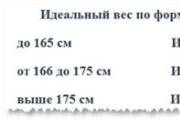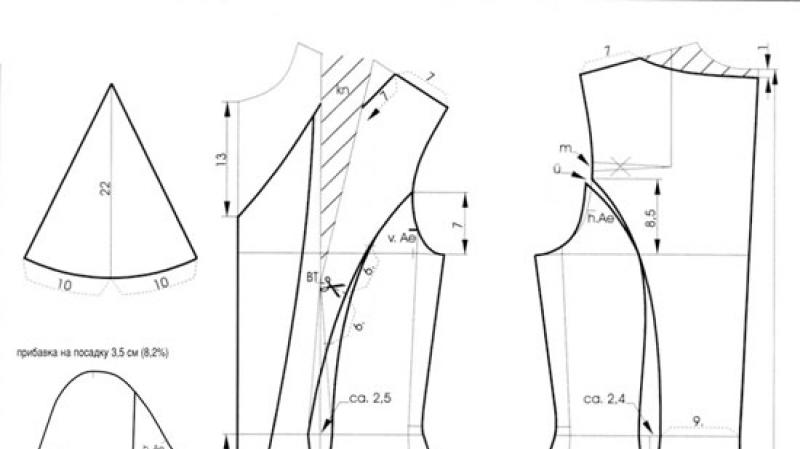What will be the retirement age for the Russians. Retirement age in Russia. Who is considered a working pensioner
raising law retirement age since January 1, 2019, it is still under consideration by deputies, but it already causes heated debate and leaves no one indifferent. Read on to find out what changes await future pensioners.
Prerequisites for raising the retirement age
According to officials, improving the pension system of the Russian Federation is an urgent need, dictated by the negative demographic situation in the 90s of the last century, as well as an increase in the life of the working population.
In June 2018, legislators proposed a new draft law No. 489161-7, which proposes a set of measures to change the pension legislation in the Russian Federation. According to the authors of the project, the innovations will reduce the budget deficit of the Pension Fund and increase pension payments to current pensioners.

The text of the bill can be found here.
The changes will affect the following forms of pension provision:
- old age;
- social payments disabled citizens;
- "Northern" and preferential payments.
The project provides for a gradual increase in the standard age of leaving for a well-deserved rest until 2034: up to 63 years for the female half of the population of the Russian Federation and 65 years for the male half. Thus, if the innovations are legalized, the transition to the pension category for men will be shifted by 5 years, and for women - by 8 years (compared to the current terms).
Let's look at the proposed legislative adjustments in more detail.
At what age do people retire in other countries?
The growth of age standards for retirement, according to officials, is dictated by the increase in the average life expectancy of Russians. In the period from 2000 to 2017, according to Rosstat, life expectancy increased: for the female part of the population by 5.5 years (from 72.2 to 77.7), and for the male - by 8.5 years (from 59 to 67 ,5).
According to predictive statistics, life expectancy by 2024 will reach: 82 years for women and 72.3-72.5 for men. And by the time the pension reform is completed, life expectancy will approximately increase to 75 years for men and 85.2 for women.
Most countries have also increased the retirement age for their citizens. The table below shows a comparative analysis of life expectancy and the period for entering a well-deserved rest in our country and in other states:
| Age of eligibility for retirement | Lifespan | A country | |
| Men | Women | ||
| 63 | 58 | 70,5-71 | Kazakhstan |
| 60 | 55 | 70,5-71 | Russia |
| 60 | 60 | 82,5 | France |
| 65 | 65 | 80 | Great Britain |
| 65 | 65 | 83,7 | Japan |
| 67 | 67 | 81 | Germany |
| 65 | 65 | 79,3 | USA |
| 60 | 55 | 76,1 | China |
| 65 | 65 | 82,2 | Canada |
| 65 | 60 | 75 | Brazil |
| 65 | 60 | 77 | Argentina |
The data are from the WHO report.
Read also The Ministry of Labor will simplify the procedure for assigning and paying pensions: details
Table of old-age retirement in the Russian Federation
So, from 2019, 1 year will be added annually to the age pension standard approved in the Russian Federation at 55 and 60 years (for women and men, respectively).
Our table will help you determine the year of your well-deserved retirement:
| Year of transition to state security under the current law in 2018 | Men | Women | Year of retirement according to bill No. 489161-7 | ||
| Year of birth | Age | Year of birth | Age | ||
| 2019 | 1959 | 61 | 1964 | 56 | 2020 |
| 2020 | 1960 | 62 | 1965 | 57 | 2022 |
| 2021 | 1961 | 63 | 1966 | 58 | 2024 |
| 2022 | 1962 | 64 | 1967 | 59 | 2026 |
| 2023 | 1963 | 65 | 1968 | 60 | 2028 |
| 2024 | 1964 and younger | 1969 | 61 | 2030 | |
| 2025 | 1970 | 62 | 2032 | ||
| 2026 | 1971 and younger | 63 | 2034 | ||
IMPORTANT!
Current pensioners and citizens who received the right to a pension in 2018 upon reaching the age of 55 and 60 (women / men, respectively) will not be affected by the reforms in the legislation. The reform under discussion covers persons who in 2018 have not yet reached the normative 55 and 60 years.
Changes for Social Pension Recipients
Recipients of social pensions also expect some changes:
- Citizens who have not worked out the length of service necessary for establishing a pension acquire the opportunity to take a well-deserved rest later for 5 years, counted from the new age limits. This means that after 2019 the opportunity to receive a social pension will come at the age of 68 and 70, respectively (for comparison, in 2018 it is 60 and 65 years).
- In the event of the loss of a breadwinner, relatives will be able to apply for a pension at the general age of 63 and 65 years (in 2018, the transition period to such state maintenance is set at 55 and 60 years).
- Parents of dead servicemen will be entitled to receive pension payments upon reaching the age of 58 and 60 (previously - 50 and 55 years), and their widows - after the age of 63.
- The normative age has also been raised for the small ethnic groups of the North by 8 and 5 years - up to 58 and 60 years (women/men).
Will the pension reform affect people retiring early?
As legislators assure, the possibility of reaching a premature pension provision the population and workers from the regions of the Far North and equivalent regions, as well as teachers, doctors and other "beneficiaries" will continue. But the retirement age for these categories of citizens will also increase due to its general growth.
Thus, employees from the regions of the extreme northern part of our country and similar territories are expected to increase the age of access to state security by 5 and 8 years: the bill assumes a 60-year threshold for men and 58 years for women (the current standards are 55 and 50 years, respectively). ). And in the same way, a gradual increase in the standard years for applying for a pension will be applied in order to achieve new age limits.
Read also Sergei Sobyanin approved minimum pension in Moscow for 2019
The state believes that for residents of northern areas, the reduction in the retirement age at one time was due to extremely difficult living conditions in the 50s of the last century. But the measures taken to improve the demographic situation significantly affected the life expectancy of the northerners.
Medical workers, citizens of creative professions and teachers are also waiting for the raising of the retirement age standards. But they will calculate the period of retirement for a well-deserved rest, starting from the period of developing special experience. According to the legislative norms in force in 2018, doctors and teachers receive the opportunity to go on premature rest if they have an experience of 25-30 years. People of creative specialties must have a special experience of 15 to 30 years, depending on the category.
Changing the exit algorithm to early retirement presented in the table:
We have considered who will be affected by the pension reform, but some categories of citizens will not feel it. Who exactly - read on.
Preferential categories of pensioners
Pension changes will not affect:
- Performing labor duties in unsafe (harmful) conditions:
- employees servicing locomotives and trains, as well as employees who create conditions for the safe movement of railway transport and the subway;
- truck drivers working in mines;
- those who work in hot shops underground;
- employed in textile production (women only);
- members of expeditions, geological exploration, topographic, geodetic, forest management, prospecting workers;
- employees of the crews of the river fleet and sea fleet, as well as the fishing industry;
- flight personnel and engineers serving civil aircraft;
- mountain rescue and rescue personnel;
- those who extract natural resources in mining, build mines and mines;
- workers executing criminal sanctions in the form of imprisonment;
- employees working in timber rafting and logging;
- tractor drivers of farmland, as well as drivers of road, construction and loading and unloading vehicles (women only);
- those who drive passenger vehicles.
- Persons whose pension for health reasons or social reasons is established earlier than the generally approved time:
- mothers who gave birth to 5 or more children and raised them up to the age of 8;
- received military bodily injuries;
- mother or father disabled from infancy, who raised him until the age of 8;
- guardians of people with disabilities from childhood who raised them up to 8 years;
- visually impaired people of the 1st group;
- women who have the necessary insurance work experience in the areas of the extreme northern regions, who have given birth to 2 or more children;
- midgets and dwarfs;
- reindeer herders, hunters, fishermen permanently living in the regions belonging to the Far North.
- Victims in man-made or radiation tragedies, including those at the Chernobyl nuclear power plant.
- Pilots of test and serial parachute, aeronautical and aviation equipment.
Transition period
The increase in the retirement age will be gradual. A long transition period is envisaged. For men - until 2028. For women - until 2034.
Who is first?
Photo: © RIA Novosti / Vitaly Belousov
Now women in Russia retire at 55, men at 60. In 2020, women will be able to retire at 56, men at 61. Thus, the first to be affected by the reform will be women born in 1964 and men born in 1959.
The next increase will be in 2022. Women will be able to retire at 57 and men at 62. Then there will be three more stages of increase with an interval of two years.
As a result, when the transition period passes, women will retire at 63, and men at 65. You can see more details about the stages of promotion in our infographic.

Workers of the Far North
Workers in the Far North have pension benefits. They will stay. Now men in the North have the right to retire at 55, women at 50. The retirement age will increase to 60 for men and 58 for women. The increase will also be gradual.
Health workers and teachers

For doctors and teachers, the retirement age is being raised. But here is a more complicated scheme, because these (and some other) categories of workers have the right to retire early. To do this, you need to have a long experience - it lasts from 15 to 30 years (depending on the profession).
The increase will also be gradual. For example, now a teacher, having worked for 30 years, has the right to retire immediately (it does not matter how old he is).
In 2019, there will be the first stage of the increase. Let's say it was in 2019 that our teacher gained 30 years of experience. The teacher will be able to use his right to retire only a year later, that is, in 2020.
The last stage of the increase will be in 2026. A teacher who has accumulated 30 years of experience by 2026 will be able to retire after 8 years, that is, in 2034.
officials
For civil servants, the retirement age will increase in the same way as for all other Russians.
Non-working

Those who have never worked (or did not have time to work minimum experience is 7 years) will still receive a pension. But it will be appointed later. For women, the age will increase from 60 to 65 years, for men - from 68 to 70 years.
Who will not be affected by the changes?
Russians who already receive a pension will continue to receive it.
Also, the changes will not affect miners, employees of enterprises for the extraction of ferrous and non-ferrous metals, railway workers, as well as all Russians whose working conditions are legally recognized as difficult.
All these changes also do not apply to other social payments. For example, disabled people, as now, will be entitled to a social pension, regardless of age.
How much is a pension?

Photo: © RIA Novosti / Evgeny Yepanchintsev
In 2018, the average insurance pension non-working pensioners- 14.4 thousand rubles. Annually the pension increases by 300-500 rubles.
On October 3, 2018, Vladimir Putin signed a package of laws on changes to pension legislation, including on raising the retirement age from 2019. A week earlier, the corresponding one in the final, third reading was adopted by the deputies of the State Duma, taking into account a number of significant amendments, including those proposed by the President himself in a televised address to the citizens of Russia on August 29, 2018.
V. Putin's proposals were approved by the deputies unanimously, since the main goal of the presidential amendments was easing pension changes, in particular:
According to the initial draft of the pension reform, prepared by the government under the leadership of Medvedev, after the transition period, which will begin as early as 2019, the retirement age was to be 65 years for men and 63 years for women. At the same time, all proposed changes should have been carried out taking into account a long transition period - within 5 years for men (by 2023) and 8 years for women (by 2026). Such a bill was adopted in the first reading on July 19 in the State Duma, and by the second reading it was adjusted taking into account the proposed amendments, including the presidential ones. In the final version of the law, the retirement age is 60 and 55 years, respectively, and the transition period will last 5 years.
Law on raising the retirement age
The text of the final law No. 350-FZ of October 3, 2018 on raising the retirement age, signed by the President, can be found below:
In connection with the increase in the retirement age, there will also be changes deadlines for retirement pension. This will affect those citizens who, by the time they reach the age of 65 and 60, respectively, will not be able to enter the usual labor pension due to the fact that they have not scored a sufficient number of pension points and insurance experience. For them, the retirement age will increase. up to 70 years for men and up to 65 years for women(Now you can apply for men over 65 and women over 60).
Retirement schedule by year from 2019
As a result of the discussion of the bill in the State Duma, taking into account the amendments of Vladimir Putin, a final decision was made on the pension reform, and the table of retirement age values as a result of all the changes envisaged will look like this:
According to the schedule, which has been adjusted to take into account presidential amendments, in 2019 men and women who turn 60 and 55 years old in the first half of the year (men born in 1959 and women born in 1964) will retire - they will have to work half a year more (respectively 60, 5 and 55.5 years). Those who turn 60 and 55 in the second half of 2019 will receive payments in the first half of 2020 (six months after their 60th and 55th birthdays).
Why is pension reform necessary?
The Government substantiates the need for the next one by the fact that the existing ones until the end of 2018 (55 years for women and 60 years for men) were adopted back in the days of the USSR (in 1932), which does not correspond to the current situation in the country: working conditions have changed significantly, the duration of the active life phase and the life expectancy of Russians, etc.
The budget funds saved as a result of raising the retirement age, according to Kommersant, can be used to implement the new May Presidential Decree No. 204 dated May 7, 2018 “On National Goals and Strategic Objectives of Development Russian Federation for the period up to 2024".
“If the retirement age is increased by five years from 2019 in a tough version, most of the national projects will be paid for with this savings.”
Newspaper "Kommersant" No. 81 of 05/15/2018
The fact is that in order to fulfill the goals of Russia's long-term national development projects, it will be necessary to redistribute expenditures, as well as attract additional funds to the federal budget. Against the background of this task, set by the President in May 2018, the Government once again returned to the issue, which is based on raising the age of citizens, upon reaching which they are entitled to receive an old-age pension.
The changes proposed by the Government will allow in the future to increase the average amount of pensions for Russian pensioners above the rate of inflation(average ). Thanks to this, the task set by the President to increase the income level of pensioners at a rate exceeding the rate of inflation will be fulfilled.
Pros and cons of increasing the retirement age in Russia
Discussion of issues related to changes in the pension system, one way or another, takes place regularly. Even President Vladimir Putin himself last years repeatedly stressed the need to increase the retirement age, which should be gradual.
Objective reasons there is for this. Thus, according to Rosstat, the retirement age values established at the end of 2018 (according to part 1 of article 8 of the federal law of December 28, 2013 No. 400-FZ are 55 years for women and 60 years for men as of December 31, 2018) are based on outdated indicators of life expectancy of Russians - namely, on data from 1926-1927 (see table).
Experts note that by 2030 the proportion of the disabled population over retirement age will increase by 2.8% compared to 2018 (from 38,023.9 thousand people to 41,386.4 thousand people). In turn, the share of the working-age population will decrease by 1.7%.
However against the increase There are many more reasons for retirement age. First of all, raising the retirement age may create risks of unemployment among young people and older workers, which will affect the level of poverty and lower wages in the Russian Federation. In addition, this change may cause an increase in the number of registrations (50% of Russians aged 60 have diseases for which they can apply for a pension).
The three “opposition” parliamentary parties (“Fair Russia”, the Communist Party of the Russian Federation and the Liberal Democratic Party) also received statements of disagreement with the changes proposed by the Government, so they voted against adoption of the relevant law. On May 15, 2018, State Duma deputies from the Communist Party of the Russian Federation even introduced bill No. 466379-7, which suggests moratorium on raising the retirement age until January 1, 2030.
RANEPA experts developed their own concept of reforming the pension system of the Russian Federation, which generally excludes the need to raise the retirement age, subject to an increase from the federal budget and an increase by 5 percentage points (thus increasing the tax burden on employers).
If we dwell on raising the retirement age, then the RANEPA believes that the best option it would be to carry out the reform according to the following scenario:
- raise the retirement age
- up to 60 years for women (that is, for 5 years);
- up to 63 years for men (that is, for 3 years);
- do this increase smoothly - for 3-6 months a year.
Russian pensioners turned to the Pension Fund for an explanation of what date they will be paid pensions in February 2019, because this month there will be a holiday - Defender of the Fatherland Day, and, most likely, postal and bank branches will be closed for the most part. Representatives of the Fund reassured the citizens that the payment would be timely.
The exact schedule for the payment of the February pension, Russians can be found on the PF website. In general, it is the same as in previous years.
Pensions next month will be paid to citizens on time. February 23 is a holiday that falls on Saturday, so there are no shifts in the schedule. Payments will be provided on the dates when pensioners usually receive them. If the date falls on a holiday, the pension will be paid on Friday.
Receiving a pension through the Russian Post: the period for paying pensions is from the 1st to the 24th day. Bank and post offices will not work on February 23, and pensioners who are supposed to receive payments on the 23rd and 24th will receive them on the 22nd.
Receiving a pension through Sberbank: by order of the Ministry of Labor No. 885-n dated November 17, 2014, funds are transferred according to the approved schedule, starting from the 3rd day. If the payment deadline falls on a holiday or a non-working day, the schedule is shifted “backward”, but not more than 3 days. The first to receive pensions are participants in the war, survivors and the disabled.
In February 2019, the payment of pensions will take place in the standard mode according to the working schedule of post offices and banks.
How many indexations are planned for 2019

Back in the summer of 2018, some officials pointed to a double indexation of pensions in 2019. And therefore, many are interested in what month of 2019 will increase pensions for the second time. To answer this question, let's break down all the pension increases planned by the authorities.
January 2019 - insurance old-age / service pensions for non-working pensioners.
February 2019 - an increase in the social support of the PFR, that is, indexation of the UDV, burial allowances, NSO.
April 2019 - social pensions.
August 2019 - recalculation (correction) of pensions for the working category of pensioners.
As you can see from the list, there is no talk of double indexing. Let's analyze each of the indexing options in a little more detail.
Indexation of pensions for working pensioners
As in previous years, due to the difficult economic situation in the country, indexation for working pension recipients is not planned in 2019. But this became known back in the fall of 2018, but at the same time there was a rumor that, in principle, there would be no increase.
Moscow working pensioner Fyodor Zh. turned to a lawyer for help: his pension was not indexed. The man explained that he was afraid that the indexation would not affect him even if he quit his job. The lawyer explained that his pension would be raised 3 months after his dismissal, and all missed indexations would be taken into account.
Of course, many working pensioners fear that when they increase the pension of non-working pensioners in 2019, they will simply be “forgotten” about them and they won’t have to wait for an increase when they finally retire. But this is not so, and all the due amounts will be paid to them 3 months after the dismissal, and for 3 “missed” months too.
February 2019
The February increase in pensions will affect far from all pensioners, but only those who receive the EDV and NSI, and the payments themselves do not relate to the amount of the pension content. The recipients of lump-sum cash payments include veterans, disabled people, Heroes of the USSR and the Russian Federation.
The indexation coefficient is only 1.034, therefore, for disabled people of group I, the increase will be only 123.32 rubles. Some other categories will not have to count on this amount. For example, disabled people of group III will be “pleased” with only 70.49 rubles.
April 2019
The April increase applies only to recipients of social pensions and pensions that are based on the basic social pension rate. Of course, at the end of 2018, there were rumors that there would be no increase. And, alas, it really won't. However, indexation will still take place, so the question of whether the pension will be increased in 2019 for “social workers” can still be answered in the affirmative.
Another talk about the increase factor. It will be only 2.4%, which is lower compared to 2018 (2.9%), but higher compared to 2017 (1.5%). From April 2019 base rate social pension will increase to the amount of 5,304.57 rubles. However, taking into account the Constitution of the Russian Federation and other regulatory legal acts, a pensioner cannot receive a monthly allowance less than the pensioner's subsistence level, which is set at the federal level in the amount of 8,846 rubles.
August 2019
The August adjustment applies exclusively to working pensioners and does not affect the rights of non-working pension recipients. This is not a classic promotion and not even indexing. The amount of maintenance is adjusted taking into account:
the cost of pension points, which in 2019 are regarded as 1 point = 87.24 rubles;the number of pension points earned per year, but not more than 3.
Consequently, the maximum possible increase in the pension content will be only 261.72 rubles. to the pension you receive.
Are you interested in what pensions will be increased in 2019 and by how much? Ask a question to the lawyer of the site for free by phone or online.
Pension increase from February 1, 2019

The pension increase from February 1, 2019 due to annual indexation was postponed a month earlier. So some Russian pensioners received a 7.05% bonus already in December, the rest received it in January 2019. In February, it is planned to increase social payments to pensioners, including federal beneficiaries in the amount of 3.1%.
For whom the pension increase is provided from February 1, 2019 and in what amount: latest news
Monthly cash payments are indexed every year and are paid both from the federal departmental budgets and the regional ones. From February 1, 2019, the draft Government Decree provides for an increase in the indexation coefficient in the amount of 1.034%. However, the document has not yet been adopted, so changes are possible taking into account the level of inflation in 2018, in which case the increase will be 3.1%
Indexing from February 1, 2019: who will be affected by these payments and how much?
However, indexation from February 1, 2019 will affect certain social benefits- monthly cash payments (UDV) will be increased. As in previous years, the indexation of the EDV in 2019 will take place on February 1. The monthly cash payment will be increased by the inflation rate of the previous (2018) year.
On January 16, 2019, the Government of the Russian Federation announced that all federal monthly cash payments will be indexed from February 1, 2019 by 4.3%. This was stated by the Deputy Prime Minister of the Russian Federation Tatyana Golikova.
“From February 1, all federal monthly cash payments will be indexed to the actual inflation rate for 2018, which is 4.3%. Rosstat has already published the data. An additional 25 billion rubles will be spent on this. More than 15 million of our citizens will receive increased financial support,” Golikova said.
The federal ones, in particular, include the monthly cash payment established by the territorial bodies of the PFR:
veterans of the Great Patriotic War, fighting;
disabled people, including children of disabled people;
former minor prisoners of fascism, as well as persons affected by exposure to radiation
According to the Deputy Prime Minister, the draft resolution on the indexation of payments was submitted to the government the day before.
“In the near future it will be submitted for signature to Dmitry Anatolyevich (Medvedev, Prime Minister of the Russian Federation),” said the Deputy Prime Minister.
T. Golikova also said that “in 2019, the achieved level of salaries of doctors, teachers, secondary medical workers and social workers."
“For this, all wage funds for federal and regional state employees have been increased by the growth rate of wages, which are provided for in the socio-economic development forecast for 2019-2021,” the Deputy Prime Minister said.
Payment of pensions for February 2019 will be timely or early

You can see the schedule for paying pensions in 2019 in your region on the website of the Pension Fund. It has already been published and almost does not differ from the charts of previous years.
When will the pension for February 2019 be paid?
The schedule for the issuance of pensions in February 2019 will be normal, since the holiday on February 23 falls on Saturday. All pensioners will receive their money on the appointed day and there is no reason to worry.
Payment of pensions in February through the Russian Post
In general, pensions in the country begin to be issued from the 1st of the month, and usually end by the 23-24th.
Since there is only one holiday in February 2019 - February 23, the Russian Post and banks do not work on this day.
Therefore, the pensions of those late pensioners who were supposed to receive their pension on February 23-24 will receive it earlier, at the latest on February 22.
Payment of pensions in February through Sberbank
According to the current legislation of the Russian Federation, the transfer of funds for social obligations of the state must be carried out according to the schedule. (Order of the Ministry of Labor No. 885-n dated November 17, 2014). The billing period starts on the 3rd day of each month.
If the due dates fall on holidays and non-working days, the schedule is shifted to an earlier period, but no more than 3 days before the standard settlement time. Weekend payouts will be made on Fridays. First of all, according to the schedule, pensions are given to the disabled, war veterans, military pensioners, as well as pensions for the loss of a breadwinner.
Usually, adjustments to the pension payment schedule are made in connection with additional holidays or non-working days. There will be no such extra days in February of the year. This means that pensions will be paid according to the schedule, from the 3rd to the 24th.
When will the pension for February 2019 be given?
According to production calendar, in February 2019 there are no additional days off due to holidays. This means that the delivery of the pension will be carried out as usual, according to the schedule of post offices and the Savings Bank. The first of February this year falls on a Friday, which means postmen can start delivering pensions even earlier than usual. The issuance of pensions will be completed by February 23rd. There are no additional holidays in February, so all pensioners will receive their pensions strictly on schedule.
Payout date for February 2019?
Nothing unusual in the schedule for the issuance of pensions in February 2019 should not happen, since the holiday on February 23 falls on Saturday.
All pensioners will receive their money on the appointed day and there is no reason to worry.
If, for example, the day the pension is issued falls on Saturday or Sunday in February 2019, then the pension will be issued earlier - on Friday.
This is a generally accepted rule for all payments - they are not delayed due to weekends or holidays, but they are issued a day or two earlier.
the delay can only occur due to the bank, if the citizen's pension is credited to the bank account. But even there, the delays are minimal, since the pension is one of the primary payments.
Remember the buzz about raising the retirement age? In addition, there are other features of the pension reform that are important to know about. The retirement age itself will not be raised immediately, but within 10 years, so we will start with those amendments that will affect pensioners in a few days.
It's about adding to your pension. Does this increase really exist and how much will the state add after January 1? Here we analyze only the laws and the current regulations, without rumors and speculations.
Ekaterina Miroshkina
economist
The main thing about raising pensions
Here are the main conditions for indexing pensions:
- Insurance pensions in 2019 will grow by 7.05%. One point now costs 87.24 rubles, the fixed part will be 5334 rubles.
- Average pension in Russia will increase by one thousand rubles a month and will amount to 15,400 rubles. But everyone will have their own gain. The increase depends on the previous size of the pension.
- Every year the pension will grow by about a thousand rubles. Again, average. Indexing is approved for five years in advance.
- The 7.05% pension increase applies only to non-working pensioners. Workers have indexation on other conditions and at other times.
- We took all this from federal law No. 350-FZ, and not from the media and public statements of officials.
- Pensions increase every year. Previously, the amount of the increase was about half that.
What increase are you talking about?
It's about the indexation of pensions. The state centrally increases payments to all pensioners by some percentage. This is how they compensate for inflation: food, utilities, travel and medicines become more expensive, and many older people have no other sources of income.
When discussing the law on pension reform, it was about an increase for current pensioners. They were promised to increase the amount of pensions by about a thousand rubles. With the amount of payments of 13-14 thousand rubles, the increase for many is very significant. The condition for the increase actually appeared in the law.
As it was before?
Typically, insurance pensions were indexed to a percentage that was slightly higher than official inflation. For example, with inflation of 2.5%, the indexation of labor pensions was 3.7%. In terms of the average pension in Russia, this is 500 rubles a month.
For example, last year indexation was after February 1 and amounted to 3.7%. This means that pensioner Ivan Ivanovich received 14 thousand rubles of pension until February 1, and began to receive 14,500.
In fact, the increase turned out to be symbolic: it simply went to compensate for the price increase.
The increase in rubles depends on the size of the pension. If Ivan Ivanovich receives 14 thousand rubles, in 2018 he was given 500 rubles, and Petr Petrovich with a pension of 10 thousand - only 370 rubles.
How will it be from 2019?
In 2019, insurance pensions will be indexed by 7.05%. This is almost double what it was a year ago, much more than usual, and double the estimated official inflation. For all the time of indexation under the new rules, there has never really been such an increase. And this increase is no longer just a promise of officials, but a norm of federal law.
Finding her is not so easy. In the laws on pensions, you will not find mention of 7.05% and thousands of rubles. Therefore, we tell where the indexing condition is hidden:
- There is a federal law on changes to pensions. It was signed on October 3, 2018 and will be operational from January 1, 2019.
- This law outlines the main budget items of the PFR. Paragraph 7 of article 10 specifies the fixed value of the pension point. This cost is multiplied by the number of points that each pensioner has accumulated. This is how pensions are considered in Russia.
- In 2018, one point costs 81.49 rubles, and in 2019 it will cost 87.24 rubles. Thus, the price of one point for the insurance pension increased by 7.05%.
- The cost of points when calculating the labor pension is added to the fixed payment. It also increased by about 7%. In 2018, it is 4982 rubles, and from 2019 it will be 5334 rubles - about this in paragraph 8 of article 10 of the same law.
- The fixed payout will increase equally for everyone. The total value of points depends on how many points you managed to accumulate during your work. But in general insurance pension will grow by 7%.
How much will pensions increase?
The increase depends on what kind of pension a particular person is being paid now. When they talk about a thousand rubles increase, they mean the average insurance pension in Russia - 14,414 rubles. If such a pension is increased by 7.05%, then the increase will be just a thousand. And a pensioner in 2019 will already receive 15,400 rubles.
If the pension is 12 thousand rubles, 850 rubles will be added, but 1400 will be added to the pension of 20 thousand.
How much will the insurance pension increase in 2019, R
| Retirement in 2018 | Retirement in 2019 | How much will be added |
|---|---|---|
| 10 000 | 10 705 | + 705 |
| 11 000 | 11 775 | + 775 |
| 12 000 | 12 846 | + 846 |
| 13 000 | 13 916 | + 916 |
| 14 414 | 15 430 | + 1016 |
| 15 000 | 16 057 | + 1057 |
| 16 000 | 17 128 | + 1128 |
| 17 000 | 18 198 | + 1198 |
| 18 000 | 19 269 | + 1269 |
| 19 000 | 20 339 | + 1339 |
| 20 000 | 21 410 | + 1410 |
Retirement in 2018
Retirement in 2019
How much will be added
Does this apply in general to all pensioners who have already been assigned a pension?
No, this only applies to non-working pensioners. If a pensioner works, his pension is not indexed during this period. It is recalculated once a year, taking into account the insurance premiums accumulated during the work, and that's it.
But when the pensioner quits, the payments will be recalculated taking into account indexations for the entire time of work. And they will immediately pay an increased pension.
Who is considered a working pensioner?
A working pensioner is someone who works officially and is an insured person. That is, they pay mandatory insurance premiums for it.
Here are examples when a pensioner is considered to be working:
- He has an employment contract. Compulsory insurance premiums are paid by the employer.
- He entered into a service or contract agreement. That is civil law. Then the customer must pay the fees.
- The pensioner is registered as an individual entrepreneur on any taxation system. He pays mandatory contributions for himself.
How to get an increase in pension in 2019?
For this, two conditions must be met:
- You have been assigned an insurance pension. That is, you have earned the minimum length of service and points and have reached retirement age.
- You do not work and do not pay mandatory insurance premiums for you. Volunteers do not count.
You don't need to do anything special. The pension fund will calculate the supplement itself and pay it with the next pension for 2019.
Usually Pension Fund learns about the work of a pensioner from the information provided by employers. But if something was not taken into account, you can write a statement that the pensioner is no longer working - the pension will be indexed and they will pay an increase.
What will happen to pensions after 2019?
How pensions will be raised until 2024
| 2019 | 2020 | 2021 | 2022 | 2023 | 2024 | |
|---|---|---|---|---|---|---|
| What is the price retirement score | 87.24 R | $93.00 | 98.86 R | $104.69 | $110.55 | 116.63 R |
| Raise | 7,05% | 6,6% | 6,3% | 5,9% | 5,2% | 5,5% |
| Fixed part of the pension | 5334 R | 5686 R | 6044 R | 6401 R | 6759 R | 7131 R |
| Average pension | 15 430 R | 16 448 R | 17 484 Р | 18 516 Р | 19 478 Р | 20 550 R |
| Average increase | 1000 R | 1000 R | 1000 R | 1000 R | 960 R | 1000 R |
2019
How much does a pension point cost
87.24 R
Raise
Fixed part of the pension
5334 R
Average pension
15 430 R
Average increase
1000 R
2020
How much does a pension point cost
$93.00
Raise
Fixed part of the pension
5686 R
Average pension
16 448 Р
Average increase
1000 R
2021
How much does a pension point cost
98.86 R
Raise
Fixed part of the pension
6044 R
Average pension
17 484 R
Average increase














